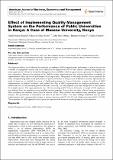Effect of Implementing Quality Management System on the Performance of Public Universities in Kenya: A Case of Maseno University, Kenya

View/
Publication Date
2015Author
Gulali Indiya Donald, Odoyo Collins Otieno, John Mark Obura, Beatrice Abong’o, Charles Ondoro
Metadata
Show full item recordAbstract/
The degree on which a set of inherent characteristics of employees fulfill an organizations’ performance, is seen to be based on
a number of management systems and styles adopted by the organization. One of such systems’ currently being adopted by
many organizations in Kenya is the Quality Management System (QMS), which is a government requirement for all public and
state corporations. However the adoption of the QMS has raised mixed reactions from various stakeholders on whether its
implementation affects the overall performance of the organization. The purpose of this study therefore was to determine the
effect of implementing QMS on the performance of public universities in Kenya, a case of Maseno University. Specifically the
study on based on; to establish the extent of QMS implementation in Maseno University, examine the effects of QMS
implementation on students’ enrolment, and establish the effect of QMS implementation on employee performance and to
establish the level of infrastructural growth of Maseno University. The study adopted a case study design since it was desirable
for in-depth analysis. The target population was 1283 non-teaching staff of Maseno University. A sample of 296 employees
was obtained from the population using stratified random sampling. Primary data was then collected using questionnaires
while secondary data obtained from records in relevant offices. Data collected was analyzed using correlation, regression
analyses. The presentation of information was done in the form of tables. The study findings established that the QMS
implementation had a strong positive impact on student enrolment with R2 of 0.615 and, infrastructural growth R2 of 0.398.
The acquisition of a QMS appeared to have ignited an important role in service rendering capacity of the institution.
